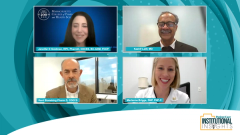
The Landscape of Diabetes: Unveiling Geographical Disparities and the Role of Prediabetes
A panel of experts in the management of diabetes addresses the profound burden of type 1 diabetes (T1D), emphasizing heightened familial predisposition for this condition. They explore geographic disparities as well as the role of prediabetes in this patient population.
Episodes in this series

The following transcript has been lightly edited for clarity and style.
Dr. Jennifer Goldman: Welcome to this Patient Care Online presentation titled "Empowering early intervention, navigating treatments for delaying type 1 progression." I'm Dr. Jennifer Goldman. I'm a professor of pharmacy practice at the Massachusetts College of Pharmacy and Health Sciences in Boston, Massachusetts. And I'm a clinical pharmacist and the director of the cardiometabolic services at Well Life Medical in Peabody, Massachusetts. Let me introduce you to our panel today.
Today, we have Dr. Kashif Latif, Dr. Kent Stoneking, and Marianne Briggs.
If you could just tell us- I've had conversations with you. It's pretty exciting what you're doing, but Dr. Latif, let's start with you. Do you want to just give us a little bit about yourself and how you're involved with delaying the progression of type 1 diabetes?
Dr. Kashif Latif: Yes. Thank you so much for that, Jennifer. Pleasure to be here. It is really exciting times because now, in addition to type 2 diabetes, we're talking about prevention or delay of onset of type 1 diabetes, which if you had talked about that just two, three years ago, everybody would have rolled their eyes. So, too exciting for us to be in this day and age and to bring to people we take care of with diabetes and their relatives and all others.
Dr. Jennifer Goldman: And you were involved in the clinical trials? Yes?
Dr. Kashif Latif: 100%. So I am a practicing endocrinologist in Bartlett, Greater Memphis area. I'm an associate professor at University of Tennessee and involved in a whole lot of trials for all sorts of indications for diabetes. And so, we were a center for teplizumab even 15 years ago. And now where things have come, it is just extremely exciting and I cannot wait for us to talk through all that has happened and where we are at this point in time, Jennifer.
Dr. Jennifer Goldman: Thank you. Welcome. Kent, how about you? A little background. What are you doing? And I heard some very exciting things about you and your involvement in the DCCT trial.
Dr. Kent Stoneking: Yes. Thank you, Dr. Goldman. It's a pleasure to be with you tonight and thank you for having me. I have had type 1 myself. I've been on that journey for 45-plus years, and thank the Lord, no complications. But I had early in my journey, about five years in, joined a trial called the DCCT and ended up being in the experimental cohort. So you're familiar with the DCCT, of course. They moved heaven and earth to get type 1 patients down to as normal blood glucose values as possible to measure the impact that would have on long-term chronic complications, but also to look at the safety of that proposition for patients with type 1. And that's where I learned how to care for myself and I've continued on. I joined Dr. Latif and the fine team at AM Diabetes a year ago January. My role is director of diabetes education and patient self-care management. So with my pharmacy background- I'm a pharmacist. I missed out on all the trial network that Dr. Latif and Marianne were so involved with. But I came along and learned about this exciting opportunity to delay type 1 diabetes. And then we had one patient that we've treated since approval of teplizumab. So it's been exciting to be a part of that.
Dr. Jennifer Goldman: Well, I'm looking forward to hearing about that patient. And the patients that you saw, Dr Latif. Marianne, you were involved in the clinical trials. Tell us what you're doing and some of your information that associated with teplizumab.
Dr. Marianne Briggs: I've been a nurse practitioner in endocrinology for about four years, so seeing lots and lots of patients and got to be involved with the study, which was really exciting and learning kind of why it's so important what we're doing, and then was able to identify our first patient and get her going with the Tzield infusion.
Dr. Jennifer Goldman: Excellent. Well, I look forward to hearing about your experiences. And let's just- the learning objectives, we'll talk about that a little bit, that we're educating healthcare stakeholders and we want to increase the understanding and the awareness of the different stages of type 1 diabetes, which I'm going to pick your brains about. That's for sure. And what teplizumab's role is in delaying type 1 diabetes. And that includes what I think is really important. That's the screening process and who's eligible for that. We'll talk about navigating the treatment process and how can we help our listeners who are here today really figure out efficient referral networks. What are you all doing in your practice? What is the plan? How do you use that 14-day infusion? How do you send someone? Where do we send someone? And optimizing patient outcomes. So we want to empower everyone out there listening to be able to improve people's quality of life and mitigating some of those burdens that we'll talk about with type 1 diabetes.
So in terms of the burden of diabetes, I don't think I have to tell all of you any of this. Well, what do you think about this? Let's talk a little bit about the risk and the cost and how that works.
Dr. Kashif Latif: I think it's a huge number, and we don't realize that- and if you start to break it down, one in ten, but geographically, it varies. In US, overall, it's about one in ten. In our county, where we are, it's about one in 13%. And then our adjacent county, in our adjacent state, Mississippi, it's about 15%. So that is a huge burden, considering the cost of taking care of everybody with diabetes. But I think we overlook the fact that for every person with diabetes, there are a lot of them who have prediabetes that we have not identified. And it used to be for type 2 diabetes, but now it is the same for type 1 diabetes, especially where the diagnosis of type 1 diabetes has taken a new paradigm and we can diagnose with the presence of two autoantibodies with normal glycemic state.
Dr. Jennifer Goldman: So it's correct to state that if somebody has a family history of type 1 diabetes, that first-degree relatives have a higher risk? Are you seeing that in real life? Is 15 times the incidence are accurate?
Dr. Kashif Latif: 100%. Kent, you like to take that?
Dr. Kent Stoneking: Certainly. Yes, we are seeing that. And so, it necessitates the messaging to those family members, those first-degree family members, of doing screening and identifying are there antibodies, is there blood glucose that's beginning to move off the mark of normal. Dr. Latif mentioned prediabetes. We've always talked about that with our type 2s. But dysglycemia now for patients who demonstrate the antibodies, who are positive for antibodies, and first-degree family members especially would begin to look for these things. And the earlier that we can identify those patients, the sooner we can intervene. And that's the exciting part.
Newsletter
Enhance your clinical practice with the Patient Care newsletter, offering the latest evidence-based guidelines, diagnostic insights, and treatment strategies for primary care physicians.

































































































































